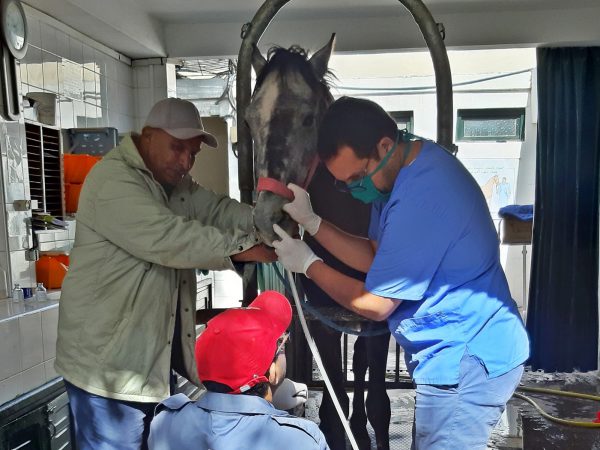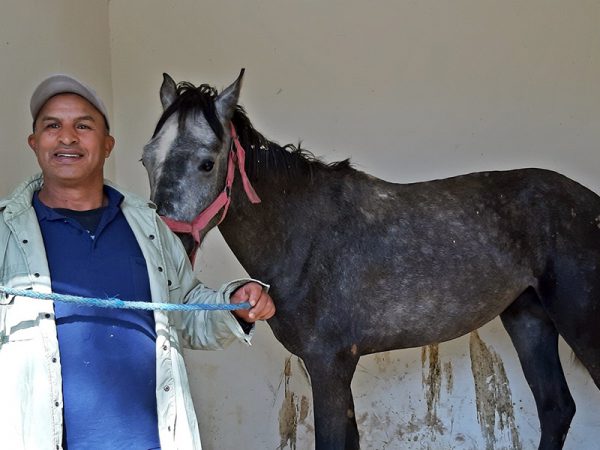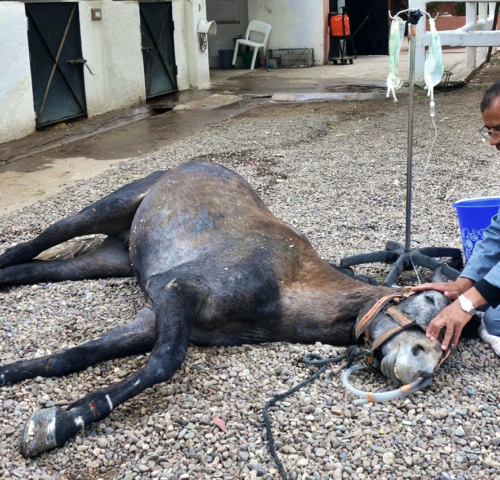
Working animals are still being hit hard by the Covid-19 pandemic
The coronavirus pandemic is having a lasting, catastrophic impact on working animals across the globe. In Tanzania and Zimbabwe, for example, our teams are expecting imminent food shortages and are concerned that thousands of working animals will starve.
Emir’s story
Emir ferries tourists around the bustling streets of Marrakech, pulling a heavy taxi carriage known as a ‘calèche’. One of 500 calèche horses that normally work through the heat of the day in the city, Emir makes just enough money for his owner Jalil to support his family.
In March 2020, life changed dramatically for Emir and Jalil and the rest of the Marrakech calèche horses and owners. When the city went into lockdown, its busy souks (markets) became eerily quiet and deserted. Along the road that is usually full of people and carts, there was no one. With no tourists to serve, Emir and Jalil can’t work. And with no work, there’s not enough money for families to feed themselves or their hardworking animals. Horses like Emir are starving and have been let loose to graze and wander the winding souks, desperately searching for food.
Before Covid-19, Morocco was already facing an awful drought. Now, there’s nothing for starving working animals to eat. Calèche horses are resorting to eating plastic bags when they graze on rubbish.
Horses like Emir can’t vomit, so if they eat plastic or toxic chemicals, or if something gets stuck in their gut, it can be life threatening. When Jalil noticed that Emir had become constipated and was losing his appetite, he grew worried. Emir’s condition deteriorated rapidly. Soon he was lying on his side in extreme pain, rolling around to alleviate the discomfort. Emir was clearly in agony. In a time of complete lockdown, he needed urgent veterinary treatment.

Fortunately, our veterinary centres around the world remain open to treat working animals like Emir that need urgent care.
When Jalil brought him in to our centre in Marrakech, our vets diagnosed severe colic and admitted him immediately. They inserted a tube down Emir’s nose to soften the contents of his stomach with water, to allow the obstruction to pass more easily. Over the next couple of days, the team gave Emir fluids and small quantities of food so he could digest it slowly and regain his strength.
Our team advised Jalil not to let Emir graze on rubbish dumps where he can eat plastic, which can cause colic. Tragically, this seems to be a growing problem. Desperate calèche owners, who can no longer afford to feed their horses, are forced to turn them out to graze in the streets. It’s happening elsewhere too, with dreadful consequences. In Ethiopia, for example, more animals grazing on the streets is increasing the rate of the devastating infectious disease epizootic lymphangitis (EZL).
Jalil got Emir to the centre just in time. Fortunately, our team were able to treat Emir’s colic and he was discharged after a few days of lifesaving treatment.
But without urgent treatment, horses like Emir will die
We need your support to answer working animals’ SOS, so that we can provide lifesaving emergency care and treatment to those suffering through this global pandemic.


